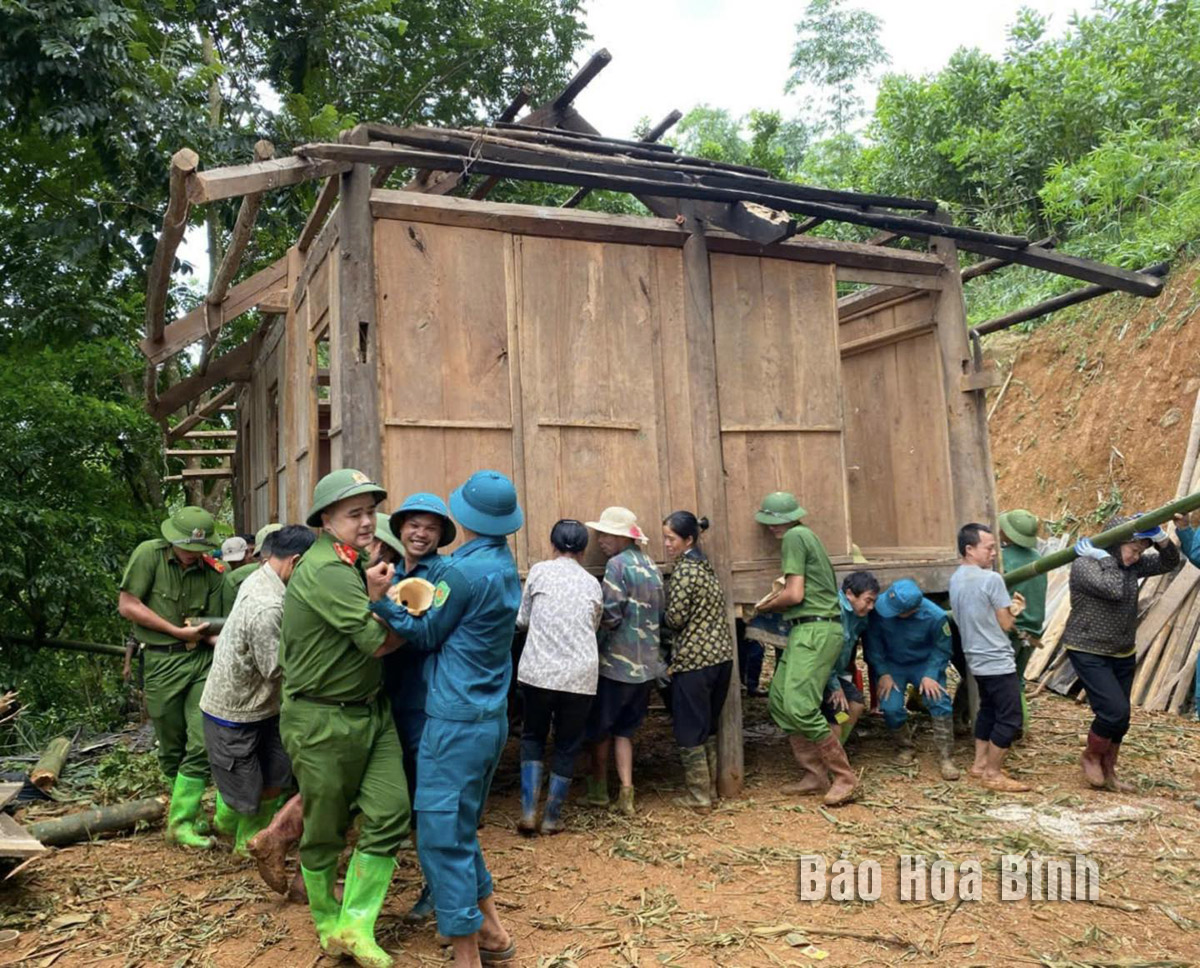
As heavy rainfall caused by Typhoon Yagi and its remnants in Hoa Binh province, the risk of landslides escalates, with several areas marked as extremely high-risk. Provincial public security forces, alongside other agencies, have been working tirelessly to help residents recover from the storm's devastating impact.
Cao Phong district police join forces with others to evacuate Bui Van Thieu’s family from a landslide-prone area in Rom Khanh hamlet.
Following urgent directives from the provincial People's Committee, police forces across the province have responded swiftly and efficiently. With 100% readiness, they have deployed all personnel, launched storm preparedness plans, and pooled resources for flood prevention and search and rescue operations.
Communication lines remain open to address emergencies promptly and support leadership directives effectively. The police have ensured the availability of essential supplies, including raincoats, boots, life jackets, ropes, flashlights, fuel, and food, for officers and those engaged in flood response.
Immediately following the storm's passing, all available resources and equipment have been deployed to minimise damage to life and property and facilitate safe travel for the community.
In Quyet Chien commune, Tan Lac district, heavy rain and strong winds inflicted substantial damage to crops and triggered landslides, affecting several roads. The road from the commune centre to Ca village suffered severe erosion. Local police, military, various departments, and mass organisations swiftly joined forces to repair the damage, assist residents in mobility, and place warning signs indicating hazards.
Driven by a commitment to ensure no one suffers from hunger, cold or danger during the storm, the provincial police have tirelessly pursued rescue and relief efforts.
They continue to collaborate with the army, local authorities, and grassroots political systems to urgently mitigate storm impacts, clear landslide-affected and flooded roads, and help residents repair their homes to restore stability in their lives.
Hoa Binh province is undergoing a dynamic transformation amid Vietnam’s national digital transition. Building on Poliburo’s Resolution No. 57-NQ/TW on breakthroughs in science, technology, innovation, and national digital transformation, the province has rolled out a wide range of practical action plans. A standout initiative is the "Digital Literacy for All” movement, an effort to ensure that no one is left behind in the digital era.
Hoa Binh province is undergoing a dynamic transformation in the wake of the national digital transformation movement. Building on Resolution No. 57-NQ/TW of the Politburo on breakthroughs in science, technology, innovation, and national digital transformation, the province has implemented a wide range of practical action plans. A standout initiative is the "Digital Literacy for All” movement ambitious effort to ensure that no one is left behind in the digital age.
With a spirit of unity and proactive problem-solving, the Party Committee, the government and the people of Dong Lai Commune (Tan Lac District) have made great strides in implementing the resolutions of the 24th Party Congress of the commune for the 2020 - 2025 term. Focusing on leadership and practical actions, the commune has brought the Party’s resolutions into daily life, creating strong impacts and pushing the local development forward.
Amid the nationwide push for digital transformation, young people in Hoa Binh Province are stepping up as dynamic pioneers, applying technology to enhance Youth Union operations and expand the reach of youth-led initiatives. Through creativity and adaptability, Youth Union organizations at all levels have introduced a series of practical solutions, contributing to modern governance and community development.
In recent years, An Nghia commune, located in Lac Son district, has stepped up administrative reform, focusing on improving the quality and efficiency of its single-window service unit for receiving and processing administrative procedures. These improvements have helped create favourable conditions for local residents and organisations to handle administrative procedures, contributing to the commune’s broader socio-economic development.
The Prime Minister-approved master plan to develop the multi-use value of forests ecosystems through 2030, with a vision to 2050, aims to improve the management and sustainable use of forest resources, create jobs, increase incomes, and improve the living standards of ethnic minorities, people in mountainous and remote areas, forest workers and those living near forests.



